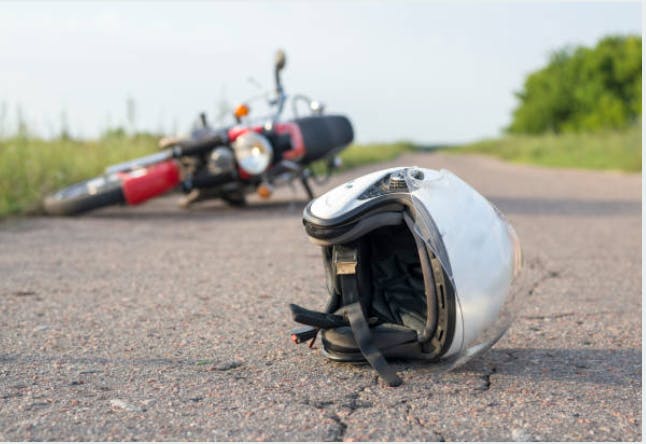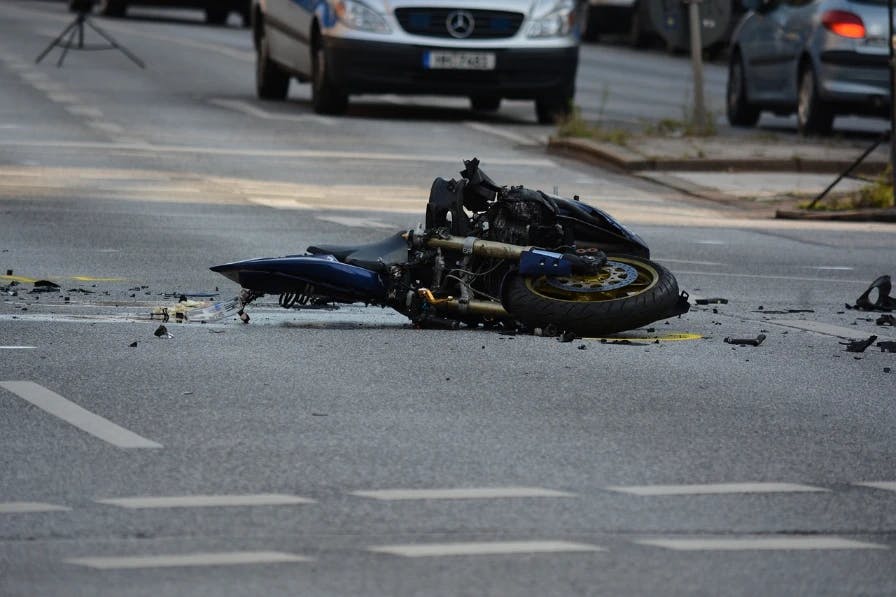Can I File a Motorcycle Accident Claim If I Am Partially at Fault?
Wondering, Can I file a motorcycle accident claim if I am partially at fault? The answer is, generally, no. Most jurisdictions operate under comparative negligence, a legal concept that allows for claims even when you share in the fault. Brian C. Gutierrez provides essential insights into how you can still pursue compensation and what steps to take to navigate this complex area of law effectively.

Brian C. Gutierrez and our team understand the nuances of motorcycle accident claims and the challenges that may arise, especially when partial fault is involved. We have a proven track record of helping individuals like you navigate through these complexities and secure the compensation they deserve. Our commitment to client success drives us to thoroughly investigate each case, build a robust strategy, and advocate tirelessly on your behalf.
If you find yourself in a situation where you’re unsure about your eligibility to file a motorcycle accident claim due to partial fault, don’t hesitate to reach out to us. We offer a free consultation to discuss the details of your case and provide personalized guidance. Remember, you don’t have to face this process alone. Let our experienced team support you in seeking the compensation you need for your recovery. Contact us today at 979-271-5338 to take the first step toward the resolution you deserve.
Partial Fault in Motorcycle Accidents
Being partially responsible in a motorcycle accident means youve contributed to the accident either through your actions or failure to act appropriately. Fault determination requires a detailed analysis incorporating evidence, rider behavior, road conditions, and statements from the involved parties. This is usually performed by a police officer at the accident scene. Keep in mind that being partially at fault does not necessarily preclude you from receiving compensation. Depending on local laws, you can still recover some of your losses, although they might be reduced based on your degree of fault.
Partial fault in motorcycle accidents is governed by two primary theories of negligence: comparative negligence and contributory negligence. These concepts significantly influence the determination of compensation in motorcycle accident cases.
Comparative Negligence
Comparative negligence allows you to pursue compensation even if you bear partial responsibility for an accident. This legal principle comes in two forms: pure comparative negligence and modified comparative negligence. In the pure form, you can recover damages regardless of your fault percentage. However, under modified comparative negligence, you can only recover if your fault is under a specific threshold, typically less than 50%.
The allocation of fault directly affects your compensation. For example, if youre awarded a $10,000 settlement but are found 25% at fault, youll receive $7,500, not the full amount. Hence, grasping the subtleties of comparative negligence is vital in any motorcycle accident case.
Contributory Negligence
Contributory negligence is a more stringent principle. If you contributed to the accident in any manner, you might be barred from recovering compensation. The determining factors include whether your actions directly caused the accident and the subsequent injury or damages.
Although this might seem unfair, it emphasizes the importance of being cautious and responsible on the road. It also underscores the need to understand your rights and responsibilities as a motorcycle rider. But what happens when youre partially at fault? How do you prove negligence and seek compensation?
How to Prove Negligence in Motorcycle Accident Cases
Proving negligence lies at the heart of any motorcycle accident claim. The first step typically involves a thorough investigation of the accident to gather pertinent evidence. This process is essential to establish negligence and build a strong case for motorcycle accident victims. Seasoned personal injury attorneys such as Brian C. Gutierrez play a critical role here, as they evaluate evidence, collect witness statements, and acquire accident reports. Establishing negligence is pivotal for securing financial compensation in motorcycle accident claims.
To build a compelling case, youll need to gather as much evidence as possible and work closely with professionals who can help establish fault.
Gathering Evidence
Evidence collection is a critical step in constructing a robust motorcycle accident case. The types of evidence typically include physical evidence from the accident scene and testimonial evidence from witnesses. The most efficient techniques for evidence collection involve contacting the authorities, documenting injuries and damage, interviewing witnesses, preserving clothing and equipment, seeking medical attention, and maintaining a record of events. Eyewitness testimonies can be particularly effective in determining liability and negligence.
Although evidence collection is vital, enlisting the help of professionals can further enhance the credibility and robustness of your case.
Working with Professionals
Professionals like accident reconstructionists play a crucial role in motorcycle accident cases by analyzing the accident site, collecting vital evidence, and identifying underlying factors that led to the accident. Their comprehensive inspection of the vehicles, crash site, and evidence can help establish liability. Their testimonies, based on professional insight, offer specific knowledge and opinions on disputed issues, helping jurors understand the technical aspects of the case. Apart from these professionals, investigators, doctors, and physical therapists may also contribute to your case.
Recovering Compensation When Partially at Fault
If youre partially at fault in a motorcycle accident, you can still seek compensation. However, the amount you receive will be reduced based on your percentage of fault. External factors such as poorly maintained roads, inadequate signs, and other hazardous road conditions can also contribute to the accident and impact your compensation.
In some cases, the last clear chance doctrine can be applied, which argues that the other party had the last opportunity to prevent the accident but failed to do so. In such cases, attorneys are instrumental in demonstrating a lower percentage of fault and aiding in seeking compensation from multiple parties.
To maximize your compensation, youll need to focus on reducing your percentage of fault and seeking to recover compensation from multiple parties.
Reducing Your Percentage of Fault
Reducing your percentage of fault can improve your chances of receiving compensation. This involves:
- Enhancing visibility
- Refraining from riding under the influence
- Collecting substantial evidence
- Exercising caution around left-turning cars and during lane changes
Legal representation can be instrumental in the legal process of gathering evidence and constructing a compelling case to counteract bias, ultimately aiming to diminish your percentage of fault. Comprehending the implications of comparative negligence for your case is crucial, and often necessitates legal advice.
Apart from reducing your fault, you can also seek compensation from multiple parties.
Seeking Compensation from Multiple Parties
Seeking compensation from multiple parties can optimize the recovery of the injured party, as it ensures that each accountable party is held responsible for their share of the damage. The allocation of fault in a motorcycle accident is determined by comparative fault laws, which assign responsibility among the parties involved based on the level of fault each bears for the accident. Legal principles such as joint and several liability and comparative negligence play a crucial role in facilitating the pursuit of compensation from multiple parties.
Interacting with insurance companies as a rider who is partially at fault can be complex, yet its an integral part of the recovery process.
Dealing with Insurance Companies as a Partially At-Fault Rider

When youre partially at fault, dealing with insurance companies can be daunting. Your statements could be used against you to diminish your compensation or reject your claim altogether. Insurance adjusters might use strategies to make you doubt your own responsibility for the accident, thereby reducing their payout.
To secure a just settlement, consider enlisting the assistance of a motorcycle accident lawyer such as Brian C. Gutierrez prior to reaching out to the insurance company. Navigating through these complexities requires protecting your rights and negotiating a fair settlement.
Protecting Your Rights
As a motorcycle accident victim, you have the right to seek compensation for your injuries and damages. Protecting these rights throughout the claims process is crucial. In Texas, you can still seek compensation even if you are partially at fault, but the damages will be adjusted based on your percentage of fault.
Despite the challenges, securing fair compensation in the form of a fair settlement is possible, especially with the right support.
Negotiating a Fair Settlement
A proficient attorney can manage the intricacies of your claim, engage in discussions with insurance firms, and present substantiating evidence to advocate for your case, thereby securing an equitable settlement despite your partial fault. The negotiation process involves collecting evidence, evaluating damages, and employing strategic negotiation techniques to advocate for a favorable settlement. Insurance companies take into consideration factors like the severity of injuries, amount of medical expenses, lost income, and the liability of the involved parties. An attorney can contest these evaluations, advocate for a reduced level of fault, and ensure that the settlement sufficiently compensates for your injuries, losses, and damages.
While negotiating a fair settlement can be challenging, an experienced motorcycle accident lawyer can make all the difference.
The Role of an Experienced Motorcycle Accident Attorney
Hiring experienced personal injury attorneys is important to guide you through the legal procedures and secure the rightful compensation you deserve. Even when partial fault is present, a proficient attorney such as Brian C. Gutierrez can effectively advocate for your case and work to reduce your portion of liability, ultimately improving your chances of securing equitable compensation. They will thoroughly elucidate the potential damages and diligently strive to obtain full compensation for all incurred injuries and losses.
How Brian C. Gutierrez Can Help You
Accidents are never straightforward, especially when youre partially at fault. Understanding your rights, the legal principles of negligence, and the process of proving negligence are key to navigating through your motorcycle accident claim. Reducing your percentage of fault, seeking compensation from multiple parties, and dealing with insurance companies may seem daunting, but with the right guidance, you can overcome these challenges.
Brian C. Gutierrez, with over 15 years of trial law experience, has successfully resolved over 1,000 personal injury cases in Texas. We offer a complimentary personal injury consultation, and work on a contingency fee basis, meaning you only pay legal fees if we successfully win your case. You can reach out to us at 979-271-5338 for more information.
Given his vast experience and commitment to his clients, Brian C. Gutierrez is an excellent choice for legal assistance in motorcycle accident cases, even if you are partially at fault. Remember, even if youre partially at fault, you have the right to seek compensation for your injuries and damages. Dont let your partial fault deter you from fighting for what you deserve.
Frequently Asked Questions
Who’s at fault in most motorcycle accidents?
In most motorcycle accidents, car drivers are usually at fault. They may exhibit poor driving behaviors like disregarding motorcyclists, making improper left turns, and opening their doors without checking for oncoming traffic.
What to do after an accident that is not your fault?
After an accident that wasn’t your fault, it’s important to check for injuries, call the police, gather information, inform your insurance company, seek medical treatment, and consider contacting a car accident lawyer to protect your rights and interests. Be cautious when dealing with the insurance company.
What does being partially at fault mean in a motorcycle accident?
Being partially at fault in a motorcycle accident means that your actions or failure to act have contributed to the accident.
How can I reduce my percentage of fault in a motorcycle accident?
To reduce your percentage of fault in a motorcycle accident, focus on enhancing visibility, refraining from riding under the influence, collecting substantial evidence, and exercising caution on the road. These steps can strengthen your case in the event of an accident.
How can an experienced motorcycle accident attorney assist me?
An experienced motorcycle accident attorney such as Brian C. Gutierrez can assist you by guiding you through legal procedures, proving negligence, reducing your portion of liability, and securing rightful compensation.
Talk to Us Today
Get a free case evaluation

